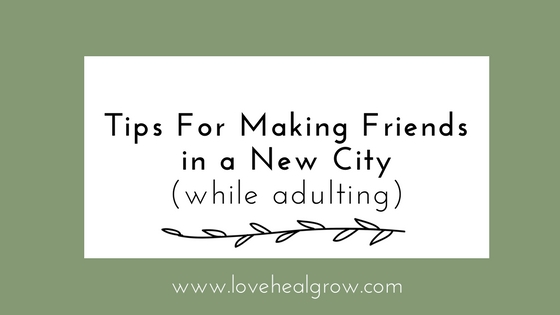
Adulting is Hard.
Making-friends-in-a-new-city-while-adulting can be harder.
A friend and I were chatting over coffee about the growth in Sacramento as twenty- and thirty-somethings have begun to look for more affordable, but still hip cities to put down roots.
Having both made this same decision (me way back in 2008, she much more recently), we shared our experiences, our struggles and the lessons we learned.
The biggest challenge we both identified was growing a support system in our new city—adulting is hard and finding friends while adulting can be even harder.
She graciously gave me permission to share her story, as well as some tidbits that could help anyone else coping with a similar move.
June’s Story
June moved to Sacramento from San Francisco in her early thirties. She relocated for a new job and didn’t have any friends in the community.
Have you had a big move like that? Not only dealing with the pain in the butt of finding a new place to live and moving all your stuff, the stress of adjusting to a new work environment, and the sad goodbyes to your old community—but adding the loneliness of a shrunken social circle as the cherry on top?
That’s enough to send me crying into a Ben & Jerry’s sundae every night.
Every time she felt lonely, she would think of the strong support system she left behind in her old community. The types of friends that she knew would have her back on the good days and the bad.
The thought of rebuilding a support system this strong seemed overwhelming.
First, she decided to throw herself into her work. She’s excellent at her job and it was easy for her to focus on getting to know her new team and reaching for her professional goals. When she did make the time for social support, she would text or FaceTime with her friends back in the bay.
The problem was, life got in the way and it became harder to connect with these friends. She realized she needed to turn her attention to fostering relationships in her new hometown.
But where to start?
Tips for Making Friends while Adulting
Get clear on what you are looking for in your friendships.
Are you more of an introvert and really value quality over quantity in your friendships? Or are you extroverted and looking for a group of friends to accompany you on weekend hiking adventure?
Ask yourself what you value in your friends and how you most enjoy spending time with them.
This all comes naturally in our younger years, but as an adult we often have less time to invest in friendships. To build the support system we thrive with, we need to prioritize and invest our time wisely.
Be Realistic (It’s going to take time)
You know in college how you and your dorm buddies could stay up all night talking– not to mention the trouble you would get into together on the weekends?
That was prime bonding time spent over hours upon hours of getting to know each other. Our ability to spend this amount of time with people as an adult diminishes—that’s okay because we can still build great friendships! Just don’t get too down on yourself when it doesn’t happen over night.
Don’t spread yourself thin. You’re older and that’s okay!
Have some self-compassion if other life priorities are getting in the way of attending every single meet-up or social gathering. If you’ve recently moved, you are going through a pretty big life transition and some down time is warranted. It’s okay to hole-up with Netflix and relax alone if you need to.
If you’ve been putting off making time for socialize, maybe set a goal of 1 social event a week to start (whether that’s inviting a new acquaintance to coffee, showing up at a new yoga class or attending a new Meet-Up group).
Invest in activities that energize you
What are you passionate about? What activities inspire and recharge you?
Invest your time in local activities that involve these passions and interests. This way you can naturally meet people with similar interests.
Step outside your comfort zone
Where’s your comfort zone and can you take one step outside it? It takes putting ourselves out there to make new friendships and this can be hard for anyone.
This looks different for different people—when we moved my husband got involved as a leader of our neighborhood association while I got active on a smaller scale by bringing cookies over to our next-door neighbors. What is a step you can take that makes the most sense for you?
Not every activity will lead to a new friendship and not every person you meet will end up as a lifelong buddy—that’s okay. Continue to prioritize investing in building the types of friendships you want and before you know it, you’ll have built a supportive community around yourself.
























